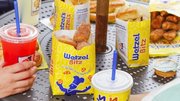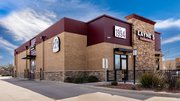Article
Passing the buck to franchisees
How McDonald's added some sugar to make specialty coffee work.

January 9, 2008
When customers said they wanted specialty coffee, McDonald's listened.But the global powerhouse known more for its burgers and fries also listened to a more familiar voice: that of its franchisees, who own 85 percent of the restaurants.
In December, McDonald's announced it would pay up to 40 percent of the cost of renovating a restaurant for the rollout, which could be as much as $75,000. Equipment to make mochas, lattes and other drinks would cost an additional $25,000
McDonald's is willing to provide the funds because it views specialty coffee as a business growth opportunity, said Danya Proud, spokeswoman for Oak Brook, Ill.-based McDonald's USA.
"Because of our commitment to them and because we feel that this is such a great opportunity for our business," she said, "we certainly want to be able to help them and contribute funding to get this in place for our customers."
The beverages are being tested in about 800 restaurants. While a date for the rollout's completion has not been finalized, Proud said the company aims to make it available in as many of its 13,700 locations as possible.
Keeping an ear to the ground
Communicating with franchisees is key to a successful rollout, said Ken Heun, senior manager of business development for Frantz Group, a business-to-business marketing services company based in Grafton, Wis. And communication is not just telling, but listening, Heun said.
"(Franchisees) have a valuable perspective," he said. "They want to feel that they're involved."
Corporate rollouts can affect franchisees on a number of levels. One aspect franchisees quickly zero in on is the cost of participation, Heun said. Another related factor is the timeframe or schedule.
"They may have plans in place, they may have budgeted their capital spending for other things, so here comes something that maybe they weren't aware of," he said. "Suddenly they're going, 'Well, now what do I do?'"
And franchisees don't like surprises, Heun said. While return on investment is their No. 1 consideration regarding rollouts, franchisees also prefer to have at least a little warning.
"We've heard it characterized as kind of a technology roadmap, so they can get a sense of cost, the impact and the rationale and timing and things like that," he said, all of which can help smooth the transition.
Heun said Frantz Group works at the intersection of the franchisor, the technology vendor and the franchisee and communicates one on one with franchisees to help them understand the technology. For one client, the company designed an online ROI calculator, with which franchisees could plug in their specific information and obtain a sense of ROI.
| ||||||||||||||||||
McDonald's has won over franchisees with what promises to be quite an opportunity for revenue, Heun said. "They see that McDonald's is willing to help them with the cost, so it now basically becomes a matter of engaging with the franchisee, seeing what other objections might be unique to a given situation and bring back more specific considerations to help smooth the rollout."
Whether for specialty coffee or the latest restaurant technology, a rollout should include mass communication of basic information: program details, timelines, funding assistance process, ROI and FAQ, Heun said. At the same time, the company must handle franchisee requests quickly and professionally. Lastly, it should engage non-responders to understand where they stand and why.
Throughout the process, Heun said it's important for companies to remember that franchisees are independent businesspeople.
"They're trying to do what's best for their business," he said. "A mandate is one thing, but the goal is to win over the franchisee, not to steamroll him. That's a lose-lose; that just never works."
Together, franchisors and franchisees should keep their ears to the ground and consider the needs of customers when orchestrating a successful rollout.
"Whether you look at the independent franchisees or you look at our corporately owned restaurants, clearly customer lifestyles have changed, customers' tastes have evolved," Proud said. For example, coffee — particularly specialty coffee beverages — is much more prominent than it was five or 10 years ago.
Through its program, McDonald's hopes to take what once was a delicacy to a much broader customer base.
"What we're doing is we are making this product available to our restaurants and to our customers at a price and a quality that only McDonald's can offer," she said. "And I think that's important because we're meeting the needs of customers that may not otherwise be able to purchase specialty coffee."










